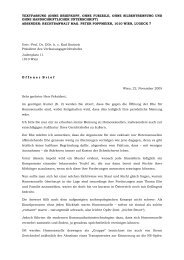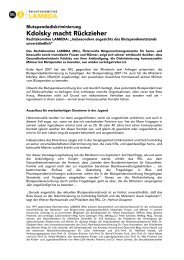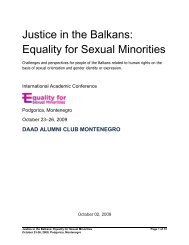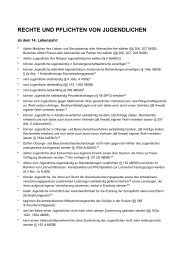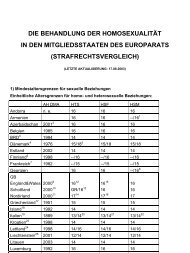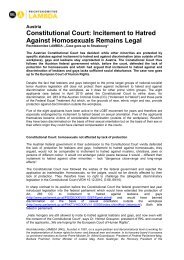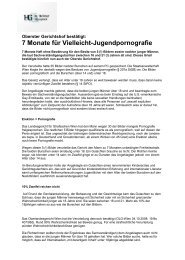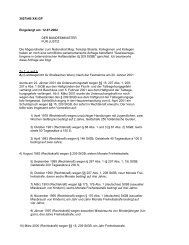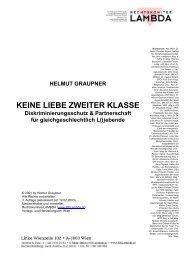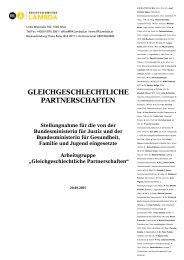document
document
document
You also want an ePaper? Increase the reach of your titles
YUMPU automatically turns print PDFs into web optimized ePapers that Google loves.
COUNCIL OF<br />
THE EUROPEAN UNION<br />
Brussels, 13 July 2001 (18.07)<br />
(OR. fr)<br />
10854/01<br />
LIMITE<br />
DROIPEN 68<br />
MIGR 61<br />
NOTE<br />
from : Presidency<br />
to : Article 36 Committee<br />
Nos prev. docs<br />
No Cion prop:<br />
5206/01 DROIPEN 2 + COR 1, 10458/01DROIPEN 59 MIGR 58<br />
COM (2000) 854 final<br />
Subject: Proposal for a Council Framework Decision on combating the sexual exploitation<br />
of children and child pornography<br />
At its meeting on 9 and 10 July 2001, the Working Party on Substantive Criminal Law continued<br />
examining the abovementioned draft Framework Decision on the basis of 5206/01 DROIPEN 2<br />
(COM (2000) 854 final) + COR 1 and 10458/01 DROIPEN 59 MIGR 58.<br />
The outcome of the discussions is outlined in the Annex hereto. Amendments to the text of<br />
DROIPEN 59 are underlined. Delegations' comments are set out in the footnotes.<br />
To prepare the ground for the future discussions of the Working Party on Substantive Criminal<br />
Law, the Presidency would like to have the views of the Article 36 Committee on the following<br />
questions.<br />
10854/01 non/AM/mc 1<br />
DG H III EN
1. Do Member States agree with the definition of child pornography as contained in Article 1(b)<br />
of the draft framework Decision in Annex I?<br />
Do Member States consider that the words "realistic images" can be interpreted in such a way<br />
that Member States are not obliged to criminalise drawings, comic strips or other similar<br />
material representing children engaged in sexually explicit conduct where no real children are<br />
involved?<br />
2. Do Member States consider that the conduct referred to in Article 2(a), when restricted to<br />
pornographic performances and where the child is not coerced into it or exposed to violence,<br />
should always be penalised?<br />
3. Do Member States consider that exceptions may be made with regard to making the<br />
production of child pornography a criminal offence when it can be shown that:<br />
(a)<br />
(b)<br />
(c)<br />
production is not for distribution;<br />
the persons represented are over 18 years of age but appear to be children;<br />
virtual images of children are used?<br />
4. Do Member States consider possession of child pornographic material to be a criminal<br />
offence in all circumstances or do they feel that exceptions may be made?<br />
5. Do Member States agree to adopt a system of penalties based on the system adopted in the<br />
Framework Decision on the strengthening of the penal framework to prevent the facilitation<br />
of unauthorised entry and residence and in the draft Framework Decision on combating<br />
trafficking in human beings?<br />
_______________<br />
10854/01 non/AM/mc 2<br />
DG H III EN
ANNEX<br />
Proposal for a<br />
COUNCIL FRAMEWORK DECISION<br />
on combating the sexual exploitation of children and child pornography<br />
THE COUNCIL OF THE EUROPEAN UNION,<br />
Having regard to the Treaty on European Union, and in particular Articles 29, 31(e) and 34(2)(b)<br />
thereof,<br />
Having regard to the proposal from the Commission,<br />
Having regard to the Opinion of the European Parliament,<br />
Whereas:<br />
The Action Plan of the Council and the Commission on how best to implement the provisions of the<br />
Treaty of Amsterdam on an area of freedom, security and justice 1 , the conclusions of the Tampere<br />
European Council, the Commission in the Scoreboard 2 , and the European Parliament in its<br />
Legislative Resolution of 11 April 2000 3 , include or call for legislative action against sexual<br />
exploitation of children and child pornography, including common definitions, charges and<br />
penalties.<br />
1<br />
2<br />
3<br />
OJ C 19, 23.1.1999.<br />
COM (2000) 167 final, pt. 4.3 Fight against certain forms of crime.<br />
A5-0900/2000.<br />
10854/01 non/AM/mc 3<br />
ANNEX DG H III EN
The Joint Action of 24 February 1997 concerning action to combat trafficking in human beings and<br />
the sexual exploitation of children 1 and the Council Decision to combat child pornography on the<br />
Internet 2 need to be followed by further legislative action addressing the divergence of legal<br />
approaches in the Member States and contributing to the development of efficient judicial and law<br />
enforcement cooperation against sexual exploitation of children and child pornography.<br />
The European Parliament, in its Resolution of 30 March 2000 3 on the Commission<br />
Communication on the implementation of measures to combat child sex tourism 4 , reiterates that<br />
child sex tourism is a criminal act closely linked to those of sexual exploitation of children and of<br />
child pornography, and requests the Commission to submit to the Council a proposal for a<br />
framework decision establishing minimum rules relating to the constituent elements of these<br />
criminal acts.<br />
Sexual exploitation of children and child pornography constitute serious violations of human rights<br />
and of the fundamental right of a child to a harmonious upbringing and development.<br />
Child pornography, a particularly serious form of sexual exploitation of children, is increasing and<br />
spreading through the use of new technologies and the Internet.<br />
The important work performed by international organisations must be complemented by that of the<br />
European Union.<br />
It is necessary that serious criminal offences such as the sexual exploitation of children and child<br />
pornography be addressed by a comprehensive approach in which the constituent elements of<br />
criminal law common to all Member States, including effective, proportionate and dissuasive<br />
sanctions, form an integral part together with the widest possible judicial cooperation; in accordance<br />
with the principles of subsidiarity and proportionality, this Framework Decision confines itself to<br />
the minimum required in order to achieve those objectives at European level and does not go<br />
beyond what is necessary for that purpose.<br />
1<br />
2<br />
3<br />
4<br />
OJ L 63, 4.3.1997, p. 2.<br />
OJ L 138, 9.6.2000, p. 1.<br />
A5-0052/2000.<br />
COM (99) 262.<br />
10854/01 non/AM/mc 4<br />
ANNEX DG H III EN
Penalties must be introduced against the perpetrators of such offences which are sufficiently<br />
stringent to bring sexual exploitation of children and child pornography within the scope of<br />
instruments already adopted for the purpose of combating organised crime, such as Joint<br />
Action 98/699/JHA 1 on money laundering, the identification, tracing, freezing, seizing and<br />
confiscation of the instrumentalities and the proceeds from crime and Joint Action 98/733/JHA 2 on<br />
making it a criminal offence to participate in a criminal organisation.<br />
This Framework Decision is without prejudice to the powers of the European Community.<br />
This Framework Decision should contribute to the fight against sexual exploitation of children and<br />
child pornography by complementing the instruments adopted by the Council, such as Joint<br />
Action 96/700/JHA 3 establishing an incentive and exchange programme for combating trade in<br />
human beings and sexual exploitation of children (STOP), Joint Action 96/748/JHA 4 extending the<br />
mandate given to the Europol Drugs Unit, Decision 293/2000/EC of the European Parliament and<br />
of the Council 5 on the Daphne programme on preventive measures to fight violence against<br />
children, young persons and women, Joint Action 98/428/JHA 6 on the creation of a European<br />
Judicial Network, the Action Plan against illegal and harmful content on the Internet 7 ; Joint<br />
Action 96/277/JHA 8 , concerning a framework for the exchange of liaison magistrates to improve<br />
judicial cooperation between the Member States of the European Union and Joint<br />
Action 98/427/JHA on good practice in mutual legal assistance in criminal matters,<br />
HAS ADOPTED THIS FRAMEWORK DECISION: 9<br />
1<br />
2<br />
3<br />
4<br />
5<br />
6<br />
7<br />
8<br />
9<br />
OJ L 333, 9.12.1998, p. 1.<br />
OJ L 351, 29.12.1998, p. 1.<br />
OJ L 322, 12.12.1996, p. 7.<br />
OJ L 342, 31.12.1996, p. 4.<br />
OJ L 34, 9.2.2000, p. 1.<br />
OJ L 191/4, 7.7.1998, p. 4.<br />
OJ L 33, 6.2.1999, p. 9.<br />
OJ L 105, 27.4.1996, p. 1.<br />
Parliamentary scrutiny reservations by D and UK,which are also examining the question of<br />
the instrument's territorial application.<br />
10854/01 non/AM/mc 5<br />
ANNEX DG H III EN
Article 1<br />
Definitions<br />
For the purpose of this Framework Decision:<br />
(a)<br />
"child" shall mean any person below the age of eighteen years;<br />
(b)<br />
"child pornography" shall mean pornographic material that visually depicts or represents a<br />
child involved or engaged in a sexually explicit conduct, including lascivious exhibition of the<br />
genitals or the pubic area of a child. This shall include realistic images of a child, whether the<br />
child is real or not, and images of a real person appearing to be a child 1 ;<br />
(c ) "computer system" shall mean any device or group of inter-connected or related devices, one<br />
or more of which, pursuant to a program, perform automatic processing of data;<br />
(d)<br />
(…)<br />
Article 2<br />
Offences concerning sexual exploitation of children<br />
Each Member State shall take the necessary measures to ensure that the following intentional<br />
conduct is punishable:<br />
1<br />
This amendment, supported by a large majority of delegations, should meet the concerns of<br />
DK and FIN. DK had entered a reservation on the ground that the definition should not cover<br />
drawings and similar material where no real child has been abused. For similar reasons FIN<br />
proposed referring to "realistic images of a person appearing to be a child".<br />
10854/01 non/AM/mc 6<br />
ANNEX DG H III EN
(a)<br />
coercing a child into prostitution or into participating in pornographic performances, making<br />
proposals to that effect, profiting from or otherwise exploiting a child for such purposes; 1 2<br />
(b)<br />
engaging (…) in sexual activities with a child, where<br />
(i)<br />
(ii)<br />
(iii)<br />
use is made of coercion, force or threats,<br />
money or other forms of remuneration or consideration is given as payment in order to<br />
induce the child to engage in sexual activities 3 , or<br />
abuse is made of a recognised position of trust, authority or influence over the child.<br />
Article 3<br />
Offences concerning child pornography<br />
1. Each Member State shall take the necessary measures to ensure that the following intentional<br />
conduct, whether undertaken by means of a computer system or not, when committed without right<br />
is punishable:<br />
(a) production of child pornography 4 ;<br />
(b) distribution, dissemination or transmission of child pornography;<br />
(c) offering or otherwise making child pornography available;<br />
(d) acquisition or possession of child pornography 5 .<br />
1<br />
2<br />
3<br />
4<br />
5<br />
P suggested including in Article 2(a) the conditions listed in Article 2(b). This proposal was<br />
not supported by the other delegations.<br />
FIN/DK maintained their reservation. FIN wanted to separate pornographic performances<br />
from prostitution and to exclude proposals made to the child to take part in a pornographic<br />
performance. The text would read as follows: "coercing a child into prostitution, making<br />
proposals to that effect, profiting from or otherwise exploiting a child for such purposes or<br />
coercing a child into participating in pornographic performances, profiting from or otherwise<br />
exploiting a child for such purposes". NL/S felt that this would be a step backward.<br />
Scrutiny reservation by DK.<br />
F/DK/FIN/D entered reservations on this Article and would like to add: "for distribution".<br />
Several delegations (IRL/NL/P/B/E/COM) were against because it would be difficult to<br />
prove.<br />
DK entered a scrutiny reservation.<br />
10854/01 non/AM/mc 7<br />
ANNEX DG H III EN
2. A Member State may exclude from criminal liability situations where: 1<br />
(a)<br />
it is established that the person appearing to be a child was in fact over the age of 18 years at<br />
the time of the depiction, or 2<br />
(b)<br />
in the case of production (…) 3 and possession, images of persons over the age of sexual<br />
consent are produced and possessed with their agreement and solely for their own private<br />
use. 4 Article 4<br />
Instigation, aiding, abetting and attempt 5<br />
1. Each Member State shall take the necessary measures to ensure that the instigation of, aiding or<br />
abetting an offence referred to in Articles 2 and 3 is punishable.<br />
2. Each Member State shall take the necessary measures to ensure that attempts to commit the<br />
conduct referred to in Articles 2 and 3(1)(a) to (c) are punishable.<br />
1<br />
2<br />
3<br />
4<br />
5<br />
DK and I had scrutiny reservations on paragraph 2. I wanted to be able to exclude cases<br />
where it can be proved that the images involved are virtual images for personal use.<br />
Reservations by B/NL and D, which contended that appearance of being a minor was<br />
sufficient grounds for proceedings to be brought. F/S/FIN/IRL and UK disagreed.<br />
The word "acquisition" as deleted but EL/A and FIN wanted it included.<br />
F said that it could agree to this text if the words "for distribution" were added to<br />
Article 3(1)(a) or if a paragraph 2 (c) were added to cover cases where it is established that<br />
production was not for purposes of distribution. DK/FIN/D supported this proposal although<br />
several delegations were against it.<br />
Scrutiny reservation by D on attempt.<br />
10854/01 non/AM/mc 8<br />
ANNEX DG H III EN
Article 5<br />
Penalties and aggravating circumstances 1<br />
1. Each Member State shall take the necessary measures to ensure that an offence referred to in<br />
Articles 2, 3(1)(a) to (c) and Article 4 is punishable by effective, proportionate and dissuasive<br />
penalties, including by terms of imprisonment with a maximum penalty that is not less than<br />
four years and, as regards an offence referred to in Article 3(1)(d), not less than one year.<br />
2. Without prejudice to additional definitions in the Member States´ legislation, each Member<br />
State shall take the necessary measures to ensure that an offence referred to in Articles 2(a) and 4 in<br />
that respect is punishable by terms of imprisonment with a maximum penalty that is not less than<br />
eight years when:<br />
– it involves a child below the age of ten 2 ,<br />
– it involves particular ruthlessness, or<br />
1<br />
2<br />
Reservation by D on a two-pronged approach and on the reference to Article 4.<br />
Reservation by FIN which wanted imposition of the maximum penalty restricted to the most<br />
serious forms of crime and to organised crime.<br />
General reservation by A on this Article .<br />
Reservation by DK which was opposed to the proposed approximation of penalties and<br />
referred to Denmark's proposals in 10853/01 DROIPEN 67.<br />
UK/F/S/P said that this Article should be examined without waiting for the results of the<br />
general review of the harmonisation of penalties.<br />
Most delegations agreed that the text should be simplified on the basis of the corresponding<br />
provisions of texts on trafficking in human beings and on prevention of the facilitation of<br />
unauthorised entry and residence. Aggravating circumstances also came in for criticism,<br />
particularly the words "particular ruthlessness" and "substantial proceeds".<br />
S suggested the words "it involves young children".<br />
10854/01 non/AM/mc 9<br />
ANNEX DG H III EN
– it generates substantial proceeds, or<br />
– it is committed within the framework of a criminal organisation.<br />
3. Without prejudice to additional definitions in the Member States' legislation, each Member State<br />
shall take the necessary measures to ensure that an offence referred to in Articles 2(b) and 4 in that<br />
respect is punishable by terms of imprisonment with a maximum penalty that is not less than<br />
eight years when:<br />
– it involves a child below the age of ten, 1 or<br />
– it involves particular ruthlessness.<br />
4. Without prejudice to additional definitions in the Member States' legislation, each Member State<br />
shall take the necessary measures to ensure that an offence referred to in Articles 3(1)(a) to (c) and<br />
4 in that respect is punishable by terms of imprisonment with a maximum penalty that is not less<br />
than eight years when:<br />
– it involves depictions of a child below the age of ten 2 ,<br />
– it involves depictions of a child being exposed to violence or force,<br />
– it generates substantial proceeds, or<br />
– it is committed within the framework of a criminal organisation.<br />
5. Each Member State shall also consider prohibiting natural persons from exercising, temporarily<br />
or permanently, activities related to the supervision of children where they have been convicted of<br />
an offence referred to in Articles 2, 3 or 4.<br />
1<br />
2<br />
S suggested the words "it involves a young child".<br />
S suggested the words "it involves a young child".<br />
10854/01 non/AM/mc 10<br />
ANNEX DG H III EN
Article 6<br />
Liability of legal persons<br />
1. Each Member State shall take the necessary measures to ensure that legal persons can be held<br />
liable for an offence referred to in Articles 2, 3 and 4 committed for their benefit by any person,<br />
acting either individually or as part of an organ of the legal person, who has a leading position<br />
within the legal person, based on:<br />
(a)<br />
(b)<br />
(c)<br />
a power of representation of the legal person,<br />
an authority to take decisions on behalf of the legal person, or<br />
an authority to exercise control within the legal person.<br />
2. Apart from the cases already provided for in paragraph 1, each Member State shall take the<br />
necessary measures to ensure that legal persons can be held liable where the lack of supervision or<br />
control by a person referred to in paragraph 1 has made possible the commission of an offence<br />
referred to in Articles 2, 3 and 4 for the benefit of that legal person by a person under its authority.<br />
3. Liability of legal persons under paragraphs 1 and 2 shall not exclude criminal proceedings<br />
against natural persons who are perpetrators, instigators or accessories in an offence referred to in<br />
Articles 2, 3 and 4.<br />
4. For the purposes of this Framework Decision, "legal person" shall mean any entity having such<br />
status under the applicable law, except for States or other public bodies in the exercise of State<br />
authority and for public international organisations.<br />
10854/01 non/AM/mc 11<br />
ANNEX DG H III EN
Article 7<br />
Sanctions on legal persons<br />
Each Member State shall take the necessary measures to ensure that a legal person held liable<br />
pursuant to Article 6 is punishable by effective, proportionate and dissuasive sanctions, which shall<br />
include criminal or non-criminal fines and may include other sanctions such as:<br />
(a)<br />
(b)<br />
(c)<br />
(d)<br />
(e)<br />
exclusion from entitlement to public benefits or aid;<br />
temporary or permanent disqualification from the practice of commercial activities;<br />
placing under judicial supervision;<br />
a judicial winding-up order, or<br />
temporary or permanent closure of establishments which have been used for committing the<br />
offence.<br />
Article 8<br />
Jurisdiction and prosecution<br />
1. Each Member State shall take the necessary measures to establish its jurisdiction over the<br />
offences referred to in Articles 2, 3 and 4 where:<br />
(a)<br />
(b)<br />
(c)<br />
the offence is committed in whole or in part within its territory;<br />
the offender is one of its nationals; or<br />
the offence is committed for the benefit of a legal person established in the territory of that<br />
Member State.<br />
2. A Member State may decide that it will not apply, or that it will apply only in specific cases or<br />
circumstances, the jurisdiction rules set out in paragraphs 1(b) and 1(c) where the offence is<br />
committed outside its territory.<br />
3. A Member State which, under its laws, does not extradite its own nationals shall take the<br />
necessary measures to establish its jurisdiction over and to prosecute, where appropriate, an offence<br />
referred to in Articles 2, 3 and 4 when it is committed by one of its own nationals outside its<br />
territory.<br />
10854/01 non/AM/mc 12<br />
ANNEX DG H III EN
4. Member States shall inform the General Secretariat of the Council and the Commission<br />
accordingly where they decide to apply paragraph 2, where appropriate with an indication of the<br />
specific cases or circumstances in which the decision applies.<br />
5. Each Member State shall ensure that its jurisdiction includes situations where an offence under<br />
Article 3 and, insofar as it is relevant, under Article 4, is committed by means of a computer system<br />
accessed from its territory, whether or not the computer system is on its territory.<br />
Article 9<br />
Protection of and assistance to victims<br />
1. Member States shall establish that investigations into or prosecution of offences covered by this<br />
Framework Decision shall not be dependent on the report or accusation made by a person subjected<br />
to the offence, at least in cases where Article 8 (1)(a) applies.<br />
2. Victims of an offence referred to in Article 1 should be considered as particularly vulnerable<br />
victims pursuant to Articles 2(2), 8(4) and 14(1) of the Framework Decision on the standing of<br />
victims in criminal proceedings.<br />
3. Each Member State shall take all measures possible to ensure appropriate assistance for the<br />
victim's family. In particular, each Member State shall, where appropriate and possible, apply<br />
Article 4 of the Framework Decision on the standing of victims in criminal proceedings to the<br />
family referred to.<br />
Article 10<br />
Cooperation between Member States<br />
(deleted)<br />
10854/01 non/AM/mc 13<br />
ANNEX DG H III EN
Article 10a<br />
Repeal of Joint Action 97/154/JHA 1<br />
The Joint Action of 24 February 1997 adopted by the Council on the basis of Article K.3 of the<br />
Treaty on European Union concerning action to combat trafficking in human beings and sexual<br />
exploitation of children is repealed by this Framework Decision<br />
Article 11<br />
Implementation<br />
1. Member States shall take the necessary measures to comply with this Framework Decision on<br />
[…] at the latest 2 .<br />
2. By the same date, the Member States shall transmit to the General Secretariat of the Council and<br />
to the Commission the text of the provisions transposing into their national legislation the<br />
obligations imposed on them under this Framework Decision. By 30 June 2004 at the latest, on the<br />
basis of a report drawn up on the basis of this information and a written report from the<br />
Commission, the Council shall assess whether Member States have taken the necessary measures in<br />
order to comply with this Framework Decision.<br />
Article 12<br />
Entry into force<br />
This Framework Decision shall enter into force on the day of its publication in the Official Journal<br />
of the European Communities<br />
Done at Brussels,<br />
For the Council<br />
The President<br />
1<br />
2<br />
It was agreed that the Joint Action should be totally repealed. The Legal Service will consider<br />
the exact wording of this Article.<br />
Two years after the date of adoption of the instrument.<br />
10854/01 non/AM/mc 14<br />
ANNEX DG H III EN



